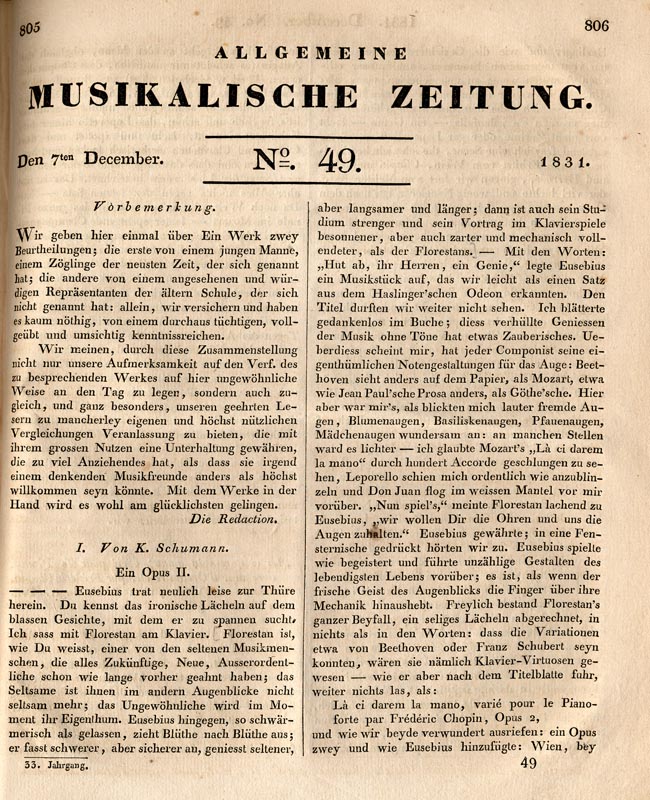Back to Schumann Exhibit Home | Exhibit Gallery
Robert Schumann
Review of Chopin’s variations on
Mozart’s
“Là ci darem la mano,” Op. 2
In: Allgemeine musikalische Zeitung,
Vol. 33, no. 49 (December 7, 1831)
Leipzig: Breitkopf & Härtel
Gilmore Music Library

In addition to being a major composer, Schumann was the leading German music critic of his era. He was a founder and editor of the Neue Zeitschrift für Musik, an influential journal that is still published today, and he wrote notable essays on many musical topics. In a curious twist of fate, his two best-remembered reviews were the first and last articles of his entire career, and each boldly hailed the arrival of a young genius: Chopin in 1831, and Brahms in 1853. In between, Schumann found other composers to admire, but none of his judgments has stood the test of time as well as these two. In 1831 Schumann did not yet have a magazine of his own, so he published his Chopin review in the Allgemeine musikalische Zeitung. (There were actually two distinct journals bearing this name; we are concerned with the one published in Leipzig, not the one from Berlin.) Both the composer and the critic were only 21 years old. Despite his youth, Chopin had already written a number of pieces that later became classics, but Schumann chose to examine a piece not now regarded as one of Chopin’s best, a set of variations for piano and orchestra on “Là ci darem la mano,” the famous duet from Mozart’s Don Giovanni. The young Schumann had to do a good deal of arm-twisting to get his article published in the somewhat fusty pages of the AmZ; the editor finally agreed to print it, but added a second review of the same piece by a different author. Schumann himself is incorrectly identified as “K. Schumann,” a typographical error that could easily have gone unnoticed, because few
readers would have known his first name in 1831.
Schumann admired authors such as Jean Paul and E.T.A. Hoffmann, who were known for their digressive and fantastic styles, and his own critical writings tend to be colorful and anything but straightforward, especially in the early phases of his career. He often presented his opinions in the voice of fictitious characters, most notably his two alter egos, the impetuous Florestan and the thoughtful Eusebius, and as well as Meister Raro, who was partially inspired by Friedrich Wieck, his piano teacher and future father-in-law. All three of these (as well as a fourth, Julius) appear in the Chopin review. Florestan enters the room where the others are gathered and announces his discovery of Chopin with the memorable words, “Hats off, gentlemen—a genius.” Despite the many novelistic touches, Schumann does in fact discuss Chopin’s piece in some detail.
Chopin was born three months before Schumann, so the Gilmore Library recently honored his 200th birthday with an exhibit. This review is the only item displayed in both exhibits.
